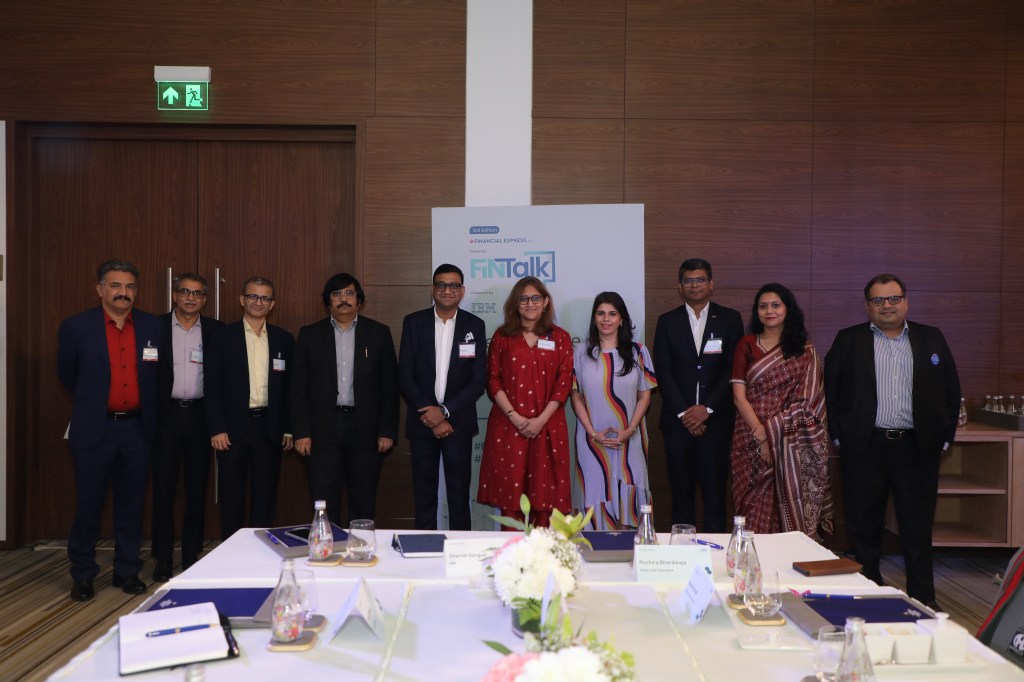By FE Connect
Generative AI is not just a buzzword, it is transforming businesses, presenting them with an opportunity for exponential growth. Sooner, rather than later, all businesses will adopt Gen AI. In fact, 90 percent of CEOs expect their leadership teams to chalk out how their companies will adopt Gen AI in various processes, according to the CEO’s Guide to Generative AI – a report by IBM Institute of Business Value. The report also points out that 85 percent of executives believe that Generative AI will interact directly with customers in the next two years.
Financialexpress.com in association with IBM organised a roundtable conference with senior executives from the BFSI sector to gauge how they are adopting Gen AI in their organisations. The conference had three tracks – one with marketing professionals and CMOs speaking on reimagining customer experience with Gen AI, the next one had CIOs and CDOs discussing how they are scaling Gen AI responsibly in their organisations and the third had CHROs discussing how they are reimagining employee experience and productivity with Gen AI.
Reimagining customer experience with Gen AI
The BFSI sector has been keen on creating personalised customer experiences by collating multiple data points to understand the customers’ needs. Yet, dealing with gigabytes of data housed in disparate data sets in multiple departments was a challenge for marketing teams to tap into until Gen AI came around, helping with content creation and real-time data analysis.
While many are using Gen AI based on public large language models (LLMs), only some have tried using the technology on their own data sets, which has the capability to create extreme customisation options. In fact, an IBM Institute of Business Value survey says 51 percent of CMOs plan to build foundation models with proprietary data by the end of the year.
As Anu Chaudhuri Ghosh, Head of Marketing, Star Union Dai-Ichi Life Insurance says, “From a marketing standpoint, we generate a lot of content from Gen AI. It gives us the ability to customize content and generate multi-lingual output. It also helps map the customer and create customised call-centre scripts.”
However, Uttiya Dey, Head-Digital and Liabilities Marketing at Yes Bank, takes a more cautious approach: “We’re still experimenting with Gen AI. It has similar use cases, but one must consider the human element as AI has a tendency to hallucinate and there is no regulation on usage.”
Ravi Kumar VR Majumdar, CGM and CXO, State Bank of India echoes the note of caution with AI, saying there has to be responsible use of AI. In the EU, the use of AI is restricted in the banking system, he says. “But, one needs to find ways to have AI understand the minds of customers, as there are increasing instances of fraud,” he says, pointing to how low-tech frauds have become high-tech with voice cloning and deep fakes.
Rohit Raina, Vice-President and Vertical Head, Direct Marketing at HDFC Bank says, “Marketing will be the biggest beneficiary (of AI). It has huge relevance for hyper-personalisation. It can understand the customer’s persona or you can offer persona-based prompts.”
Namrata Singh, Partner – Financial Services Sector Consulting, IBM, agrees. “I’m gung-ho about AI in marketing. It has a huge use case for creative agencies,” she says.
“And it can prevent plagiarism,” adds Somleena Dey, Associate Partner and CX Leader, Customer Transformation Practice, IBM, “It can also be used to scale proof of concept. One can map the cost across the value chain.”
As Ankit Goenka, Head of Customer Experience, Bajaj Allianz General Insurance points out, “Chatbots are the success story of AI. But affordability is key.” He points out how farmers are comfortable talking to the bot. He thinks this is a tool that can really empower frontline staff.
AI is increasingly being used for loan lifecycle management, as it can eliminate the human bias, and that can change an employer’s experience altogether.
Reimagining employee experience and productivity with Gen AI
Gen AI can also drive employers to bring out the best in employees whether it is ensuring optimum productivity or hiring the right talent. Some of India’s top HR leaders in BFSI acknowledge its potential, sharing insights on the changing landscape of talent acquisition, the milestones in this journey, emerging opportunities and a few pain points that technology could deal with for HR.
Vinayak Jayaram, Executive Vice President and Head of HR at Kotak Mahindra General Insurance, is confident that AI adoption will become widespread once people realise its actual power and potential. “It’s just a matter of time before we see more use cases emerging and adoption will increase,” he says.
Shamik Ganguli, Associate Partner and Leader, Private Sector Banks, Consulting, IBM, has followed industry trends for a while and concurs with Jayaram. “What we all are looking at is how to scale up the AI adoption. Right now, everyone is looking at pilots but want to make AI accessible to all,” he says, setting a reference point for where AI adoption stands right now.
Agreeing and sharing the approach of her organisation, Rajkamal Vempati, Head of HR at Axis Bank, says their bank already has a separate Centre of Excellence (CoE) looking purely at Generative AI: “To get a horizontal view of the organisation rather than just confine it to the domain of a technology office or a data office,” she explains. Vempati looks at a range of questions that organisations typically seek answers to and refers to one of the crucial queries it would have around how to train its existing set of people, repurpose them, and get them to enhance their prompt engineering skills.
Adding to her point, Rajeev Kumar, Chief General Manager HR at State Bank of India explains, “Employees should be able to visualise their career paths. In the entire HRMS journey, we are trying to build in AI with people analytics while also enhancing the chatbots.”
One of the priorities for the BFSI sector over the next six months to two years is being able to understand what AI can do and cannot do. Jayaram adds: “It is about learning through AI and what it can do for you, as well as having AI learning through you – that is machine learning or deep learning.”
AI needs the models or data sets on which it can be trained. Quoting a study that describes each human being as a pattern, IBM’s Ganguli says, “This means an organisation has multiple patterns. AI can help understand these patterns and create customised solutions. AI is going to be truly powerful when it is deep learning, which means AI is learning from the experiences of your organisation and helping deliver content for you and this may not happen with the tools organisations currently have. This is where technology partners come in and help customise it for you, leading to better retention and productivity of employees.”
Not just retention and productivity, AI can help in steering career paths for employees. Sharing her perspective, Kirti Agarwal, Chief Manager HR at Bank of Baroda, says, “What I want to understand from gen AI is the sentiment analysis and then using that insight to work towards building individual development plans. We could use all of that to place and post employees, do succession planning for their good as well as for the organisation.” The immediate priorities, she says, are upskilling, reskilling, career development and finding answers to succession planning.
Vempati adds that AI can help in grooming better managers, giving employees the choice and the voice to build their careers. Kumar concurs, “Apart from individual performance we have now started measuring team performance and in the next six months or so the process should mature.” He is enthusiastic about the use cases for AI. “There are places where the normal human mind is not going. We would want to track those blind spaces too. For example, a supervisor may have a bias towards some employees,” he adds.
Scaling GenAI responsibly
The rapid growth in AI power would need to come with its share of responsibility. At the roundtable populated by CIOs, CDOs and tech leaders, the conversation was around how to scale the use of Gen AI responsibly. They spoke about how CTOs and CIOs can ensure the alignment of AI strategies with broader business objectives while managing risk.
Citing an instance, Vikram Jeet Bhayana, Head of Marketing, Bajaj Allianz General Insurance explains how AI is used in motor insurance to assess claims. Having trained the model on several accident scenarios, AI can quickly assess pictures of the damage and honor a claim. “We assess it and transfer the money to your account in seconds. After that it’s between you and the garage to negotiate,” he says, adding that it takes a load off the call centre and other executives in between.
Aditya Kulkarni, Deputy Vice President and Head Business Intelligence Unit, Star Union Dai-ichi Life Insurance agrees on the change in customer interaction. “We have seamlessly integrated bots as the first line of customer interaction,” he says.
Rajesh Kumar Ram, Chief Digital Officer, Bank of India, agrees. He says “The use of AI bots could scuttle the incentives that traditional insurers are used to.” Kumar Ram also highlights how Bank of India has deployed AI in ATM security. The AI system analyses hundreds of images from CCTVs at bank ATMs and instead of displaying all the images on multiple screens in the control room, it can check for any unusual activity and display only that for the personnel to check. This is just one of many use cases.
To sum up, Gen AI is rapidly transforming the BFSI space and is poised to become an essential tool for the sector. From marketing and customer experiences to human resources and internal operations, Gen AI offers benefits such as increased efficiency, improved personalisation, and productivity. While challenges around responsible use and talent development exist, companies that embrace Gen AI are likely to gain a significant competitive advantage.








